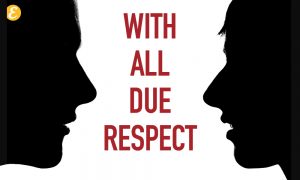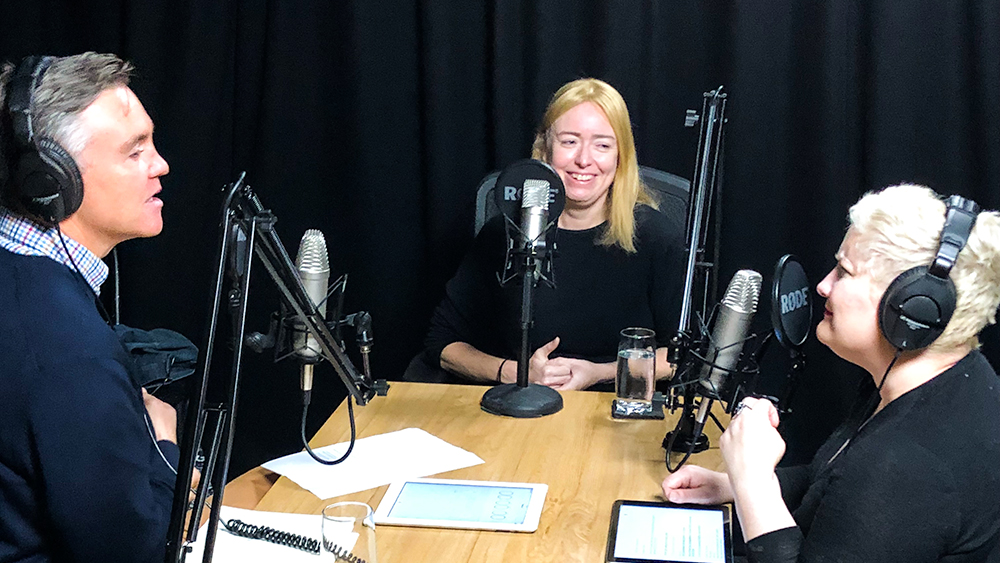Does the church have any idea how to treat single people?
Eternity’s With All Due Respect podcast recently welcomed Dani Treweek into the recording studio to help answer this loaded question. Since completing a theological degree and spending ten years in parish ministry, Dani has thrown herself into extensive research about singleness and the church. She is currently undertaking a PhD, as well as a Fellowship at Anglican Deaconess Ministries in Sydney, with the aim of developing a theological and pastoral ethic of singleness.
She will continue this work in 2020 as Researcher and Writer in Residence at Moore Theological College’s Centre for Christian Living.
Hosts of With All Due Respect, Megan Powell du Toit and Michael Jensen, fired some informed questions at Dani.
Why are you so passionate about the topic of singleness and the church?
Dani: Well, I’m a single Christian woman of a “certain” age, and so wrestling with what does singleness look like in the Christian life is something that’s obviously really personal to me. But I’m also a minister and have worked in a number of churches over ten years or so, where I spent a lot of time ministering among single women.
I recognised that many of them struggled to understand what God intended for them at this season of their life, where they belonged within the Christian community, and what the Bible actually has to say on this topic, if anything. So that kept it on the agenda for me.
There was also one particular moment when I was studying at Moore Theological College [in Sydney]. I remember sitting in our third-year ethics lecture on singleness and Andrew Cameron (who is now my PhD supervisor) was teaching. I had one of those moments where the light bulb went on over my head and I thought ‘wow, I’ve never thought about singleness like this before’ and that really started it all.
“Part of the problem with singleness is that we see it as a problem because it’s not marriage.” – Dani Treweek
How do we think about the issue of singleness without making it a problem, or is the problem that we’ve made it a problem?
Dani: I think we’ve made it a problem because I don’t think Scripture makes it a problem.
I spent the first two years of my PhD trying to deconstruct how we contemporary Christians think about singleness. I think part of the problem with singleness is that we see it as a problem because it’s not marriage.
Do Christians and the wider culture idolise marriage and romance?
Dani: Absolutely! It’s a really interesting dichotomy. I’ve spent quite a lot of time looking at ancient history, medieval history and the more modern history of marriage and singleness within the church but also outside it. We’re in a really odd contemporary moment where the Christian discourse on this stands at great odds with the secular discourse; so marriage rates have been plummeting outside the church but not so much within it.
On the other hand, the romanticisation of marriage is something that is just as prevalent within Christian discourse as it is outside it.
The sexualisation of relationships is another thing that I think we as Christians have perhaps unwittingly followed the spirit of our age more so than the word of God. So it is a very odd mix of being different but at the same time, being very similar.
What is a biblical understanding of singleness that you would want to promote?
Dani: I’ve spent four years writing a thesis on this – how long have we got?
I think that what we see in Scripture is that God has a real value for singleness, particularly this side of the cross. When we look at the Old Testament, marriage and childbearing is absolutely normative because that’s how God is building his kingdom, through the people of Israel. When the gospel comes, when Jesus dies and rises again, we suddenly see that people are not physically born into the kingdom of God, they’re reborn into it through spiritual rebirth and through disciple-making.
I think that has to provide further understanding to the way we think about the purpose of marriage, childbirth and remaining unmarried. It gives the unmarried life much more legitimacy because it allows those who are unmarried, someone like the Apostle Paul, to describe himself as a “father” to those who he is discipling, and he describes himself as a “nursing mother”, taking care of his little children. That means that as an unmarried woman who does not have children of my own, I’m called to spiritual parenthood in a way that married people are also called to be spiritual parents. That’s an example of how the gospel imbues singleness with a real legitimacy – and not just legitimacy, but privilege and blessing.
“If I am not married in this age, how does that actually allow me to point others towards the age in which none of us will be married to each other? I think there’s a really exciting opportunity that single Christians have.” – Dani Treweek
The other area that my particular research focuses on is what does it mean to live in this overlap of the ages as we’re waiting for Jesus to return, in light of eternity? And it’s an eternity that Jesus says will not actually feature marriage between human beings, because the purpose of marriage will have been fulfilled at that point in the relationship between Christ and the church.
So, if I am not married in this age, how does that actually allow me to point others towards the age in which none of us will be married to each other? I think there’s a really exciting opportunity that single Christians have here and now to be thinking about that and embracing [singleness] for that reason.
What would you say to someone who said “you’re not in a relationship, so, therefore, you’re not fulfilled”?
Dani: No-one’s said it to my face but I certainly see it in lots of writing and even in various sermons that I’ve listened to. There’s this idea that ultimate relational fulfilment comes in marriage, even to the point that we are increasingly subsuming the ideal of friendship into marriage. So often now when you look at anniversary posts on Facebook, for example, people increasingly often talk about how wonderful it is to be married to their very best friend. Of course, friendship ought to be a part of marriage, but it feels like we’re saying our spouse needs to be everything to us and meet all of our relational needs.
That then leaves a single person feeling unfulfilled – like I’m not being provided with the ultimate ideal intimacy. We’re putting enormous pressure on our marriages that I don’t think was ever God’s intention for them. That’s really problematic, not just for the single person but for the married person as well.
I had always anticipated that I would get married because that’s what we’re told to think would happen. It may still happen … but I don’t feel relationally unfulfilled. I have my moments of thinking it would be nice, but I have so much intimacy in my life in so many different ways. I’m so thankful to God for the people that he’s placed in my life.
I think we miss out by looking to marriage as the place where we find ultimate relational intimacy because there are so many other relationships out there of enormous value to us.
What would it be good to see the church do differently in relating to singles in the future?
Dani: I think we have to go back to the Bible and work hard at readjusting our theology first of all. If we don’t, it’s just like putting a band-aid on and hoping that everything will magically fix itself. If we actually don’t come to grips with what God has to say about the purpose and the value of both marriage and the unmarried life, the purpose and the value of what it is to be church and family – adopted into one new family, the new people of God – if we don’t do the hard work there, then we can make all the practical, pastoral changes we want but, ultimately, I don’t think they’re actually going to last or work.
“Church is the place where married, single, divorced, widowed, whoever you are, if you follow Jesus, this is your family.” – Dani Treweek
So the first thing is going back and really looking at what does the Bible have to say about singleness and about marriage. I want to encourage us as Christians to do hard thinking about what it means to be church family. Very often, church communities want to be a place where singles are welcome. I’m really thankful for that – I genuinely think that is a desire of most people in ministry and certainly a lot of people sitting in the pews every Sunday. But it’s very often framed in the sense of how do we make singles feel welcome amongst us, as opposed to actually recognising that this church family is as much the single person’s home already as it is the married person’s home.
Church isn’t a club for families that we hospitably welcome other people into. Church is the place where married, single, divorced, widowed, whoever you are, if you follow Jesus, this is your family.
I think there’s an adjustment that needs to happen there in the way we think about church, and then a whole lot of pastoral implications flow out of that, I would hope.
Tell us about your Single Minded initiative …
Dani: Last year we set up a team to run a conference called the Single Minded Conference, which became bigger than we were anticipating. It was meant to be a one-off conference but it’s now turned into a bit of a ministry movement, where we’re seeking to resource both married and single Christians, pastors and churches with really helpful resources on the topics of singleness, sexuality and all those related topics that surround it.
We’ve got a great resource library that we’re constantly developing, and we’ve run conferences in Sydney, Canberra and Dubai earlier this year. Hopefully next year, we’d love to do a couple more conferences throughout Australia.
For more information about Single Minded, visit singlemindedconference.com – which is currently campaigning to “make 2020 the biggest Single Minded year yet”.
 Catch the full conversation, as well as Megan and Michael’s insights into “Which is more important: your family or church family”, on episode 25 of With All Due Respect.
Catch the full conversation, as well as Megan and Michael’s insights into “Which is more important: your family or church family”, on episode 25 of With All Due Respect.
If you like what you hear, subscribe to With All Due Respect for even more conversation, less aggro.
Email This Story
Why not send this to a friend?


